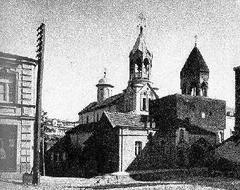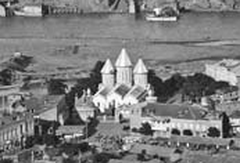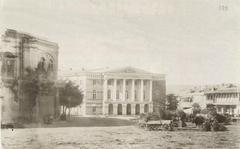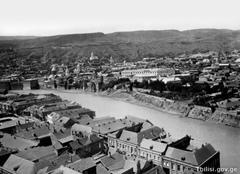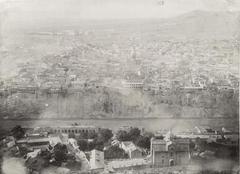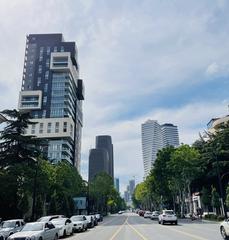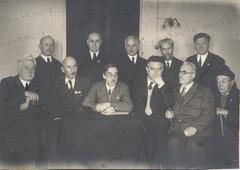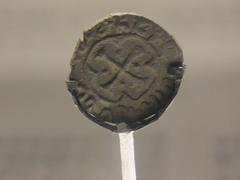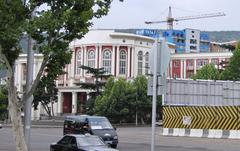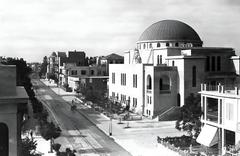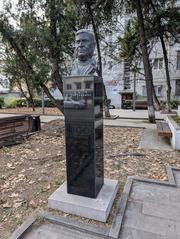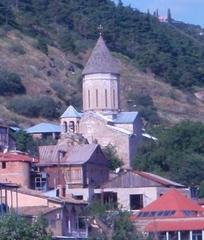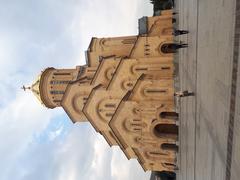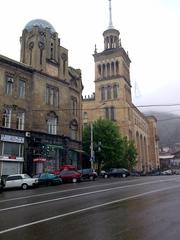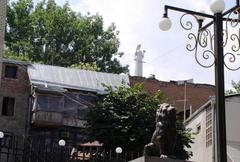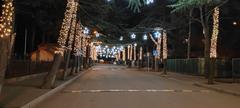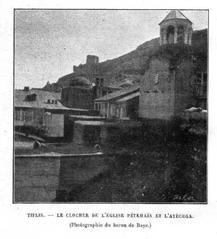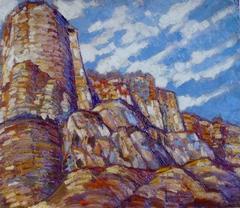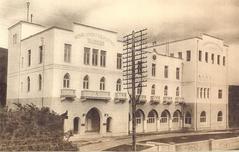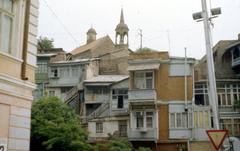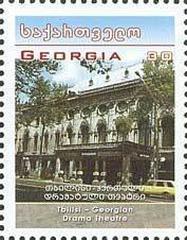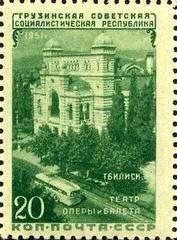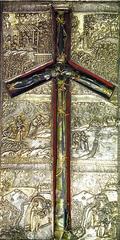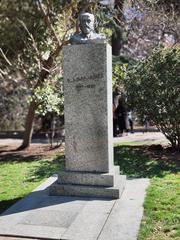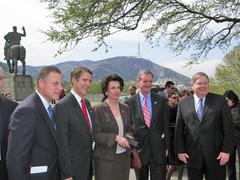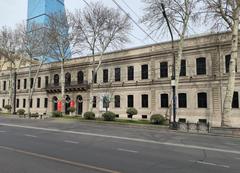Complete Guide to Visiting Caucasus University in Tbilisi, Georgia: Visiting Hours, Tickets, and Nearby Attractions
Date: 04/07/2025
Introduction
Caucasus University (CU), situated in the heart of Tbilisi, Georgia, is a remarkable destination that blends historic grandeur with modern academic excellence. Established on a site with a rich past dating back to 1909—originally serving as an Armenian Seminary—the university today stands as both an architectural landmark and a dynamic center of higher education. Its campus, marked by ornate facades and spacious interiors, invites visitors to explore a vibrant academic community and a living testament to Tbilisi’s evolving heritage.
This guide provides essential information for tourists, prospective students, and academic visitors, covering practical details such as visiting hours, accessibility, guided tours, and tips for enjoying the university’s cultural events and nearby attractions. Whether you are drawn by architectural heritage, interested in international education, or planning a cultural visit to Tbilisi, this comprehensive guide will help you make the most of your experience. For current details and guided tour bookings, consult the university’s official channels (Caucasus University Official Website, Sajeev Dev).
Table of Contents
- Welcome to Caucasus University: A Historical and Educational Landmark
- Visiting Hours, Entry, and Accessibility
- Guided Tours and Special Events
- Architectural and Cultural Highlights
- Getting There and Exploring Nearby Attractions
- The University’s Historical Evolution
- Tips for Planning Your Visit
- Architectural Heritage and Modern Infrastructure
- Student Life and Community
- The Batumi Campus Expansion
- Sustainability and Future Developments
- Practical Visitor Tips
- Frequently Asked Questions (FAQs)
- Campus Environment and Visitor Experience
- Navigating Tbilisi and Local Context
- Safety Considerations
- Summary and Recommendations
- References
Welcome to Caucasus University: A Historical and Educational Landmark
Located on Saakadze Street in central Tbilisi, Caucasus University is not only a leading educational institution but also a captivating historical monument. The main campus, housed in a building constructed in 1909, retains its original architectural charm, reflecting its history as the Armenian Seminary from 1911 to 1924. Today, the campus seamlessly integrates this heritage with modern educational facilities, making it a must-visit for history enthusiasts, academic travelers, and those eager to experience Tbilisi’s dynamic urban culture.
Visiting Hours, Entry, and Accessibility
- Visiting Hours: Monday to Friday, 9:00 AM – 6:00 PM. Confirm hours during holidays or special events via the official website.
- Admission: Campus entry is free. Some guided tours may require a small fee.
- Accessibility: The campus is largely wheelchair accessible, with ramps and elevators in renovated sections. For specific needs, contact visitor services in advance.
Guided Tours and Special Events
Caucasus University offers guided tours that illuminate the campus’s architectural features and historical evolution. These tours, available by appointment, delve into the transformation of the site from a seminary to a modern academic hub. The university also hosts public cultural and academic events—lectures, exhibitions, and performances—open to visitors. Check the events calendar online for upcoming opportunities (Caucasus University Official Website).
Architectural and Cultural Highlights
- Ornate Architecture: Admire the unique blend of early 20th-century design and contemporary renovations, with preserved stained glass, stonework, and high ceilings.
- Campus Grounds: Landscaped gardens and historic monuments make for excellent photography spots.
- Cultural Exhibits: The main hall regularly features temporary exhibits on Georgian heritage and CU’s international collaborations.
Getting There and Exploring Nearby Attractions
- Location: 73 Chargali Street, Tbilisi 0141, Georgia.
- Transport: Accessible by metro, bus, taxi, or foot from city center (Lasma Plone).
- Nearby Attractions: Freedom Square, Old Town Tbilisi, Narikala Fortress, National Gallery, Tbilisi Opera and Ballet Theatre, and the Bridge of Peace—each within easy reach for a full day of exploration.
The University’s Historical Evolution
Established in 1998 as the Caucasus School of Business, CU has expanded into a comprehensive university with multiple schools and over 300 international partnerships. Its innovative approach to Western-style education and commitment to global collaboration make it a regional leader (Study Georgia).
Tips for Planning Your Visit
- Comfortable Footwear: The campus and surrounding historic areas are best explored on foot.
- Weather: Tbilisi experiences hot summers and cold winters—check forecasts and dress accordingly.
- Guided Tours: Arrange in advance for deeper insight into the university’s history and architecture.
- Photography: Bring a camera to capture the campus and vibrant student life.
Architectural Heritage and Modern Infrastructure
CU’s main building is a showcase of Tbilisi’s architectural evolution. Renovations have preserved its character—stained glass, vintage masonry, ornate facades—while integrating advanced classrooms, labs, and high-speed internet. The library offers extensive academic resources and quiet study areas, and the science labs support hands-on learning across disciplines (sajeevdev.com, eklavyaoverseas.com).
Student Life and Community
The university’s vibrant campus life includes sports fields, fitness centers, and facilities for music, art, and academic clubs. International students benefit from integration programs and dedicated support, fostering an inclusive atmosphere (admissionoffice.ge). Cultural events and workshops further enrich the student experience.
The Batumi Campus Expansion
To meet growing demand, CU is building a new Batumi campus designed by a university alumnus. This 15,500-square-meter facility will accommodate students and school pupils, offering a library, laboratories, sports fields, dormitories, and specialized programs in maritime studies and culinary arts (ec.ge, cu.edu.ge).
Sustainability and Future Developments
The Batumi campus emphasizes sustainable design, energy efficiency, and green spaces, reflecting CU’s commitment to environmental responsibility. Ongoing digitalization and student service improvements keep the university at the forefront of regional education (ec.ge).
Practical Visitor Tips
- Dress Code: Modest attire is preferred, particularly in administrative or ceremonial areas.
- Language: English is widely spoken; learning a few Georgian phrases (“Gamarjoba” for hello) is appreciated (theinvisibletourist.com).
- Photography: Permitted; seek consent before photographing people or restricted sites.
- Safety: Tbilisi is safe, but standard urban precautions apply (wander-lush.org).
- Etiquette: Respect ongoing classes; arrange access for restricted areas in advance.
Frequently Asked Questions (FAQs)
Q: What are the visiting hours of Caucasus University?
A: Monday to Friday, 9:00 AM – 6:00 PM. Some areas may have restricted access.
Q: Is there an entrance fee?
A: No, entry is free; some tours or events may require registration.
Q: Are guided tours available?
A: Yes, by appointment via the university’s visitor services.
Q: Is the campus wheelchair accessible?
A: Most modern areas are accessible; contact the university for assistance in historic sections.
Q: Can I visit the Batumi campus?
A: Public access may be limited; check the official website for updates.
Campus Environment and Visitor Experience
International Atmosphere
CU hosts students and faculty from dozens of countries, fostering a cosmopolitan energy. Many courses are taught in English, and the university maintains partnerships with 162 universities in 54 countries (Study Georgia).
Navigating the Campus
The campus is visitor-friendly, with clear signage, free Wi-Fi, cafes, and comfortable communal spaces. Taxis and ride-hailing apps are convenient for reaching CU from the city center (Lasma Plone).
Accessibility and Amenities
While renovations have enhanced accessibility, some historic areas remain challenging for those with mobility needs. Contact the university ahead of your visit for tailored assistance.
Safety Considerations
Tbilisi is considered very safe for visitors, with a low crime rate and a welcoming population (Wander-Lush). The campus is secured and staffed with English-speaking personnel. Political demonstrations are rare and typically peaceful, but avoid large gatherings near Rustaveli Avenue, especially after dark.
Navigating Tbilisi and Local Context
- Language: English is common at CU and in tourist areas.
- Currency: Georgian Lari (GEL); cards accepted, but cash is useful for small purchases.
- Accommodation: Options range from student dorms to boutique hotels nearby (Lasma Plone).
- Health: Emergency services are reliable; dial 112 for emergencies.
- Connectivity: Free Wi-Fi on campus and in many city locations.
Nearby Historical and Cultural Attractions
Enhance your visit by exploring:
- Narikala Fortress: A fourth-century citadel with panoramic city views.
- Old Town Tbilisi: Cobbled streets, traditional architecture, vibrant cafes.
- Freedom Square, National Gallery, Tbilisi Opera and Ballet Theatre: All within walking distance of CU.
For more on Narikala Fortress, see the detailed section below.
Narikala Fortress: A Must-Visit Historical Site
Narikala Fortress, perched above Tbilisi and the Kura River, dates to the 4th century and has served as a Persian citadel and a symbol of the city’s resilience. Open daily from 9:00 AM to 7:00 PM, the fortress offers free entry; some guided tours may have a fee. Access is via a scenic hike or the Tbilisi Aerial Tramway from Rike Park. The terrain is uneven, so comfortable shoes are recommended. Guided tours and audio guides are available, and the site hosts cultural events throughout the year. Photographers will find stunning sunrise and sunset vistas. For details on tickets, events, and accessibility, consult the official Tbilisi Tourism website.
Summary and Recommendations
A visit to Caucasus University offers a unique window into Georgia’s educational heritage and contemporary culture. The campus exemplifies the city’s blend of old and new, and its proximity to Tbilisi’s top attractions makes it an ideal starting point for a cultural adventure. Free campus access, guided tours, and vibrant student life ensure an enriching experience for every visitor. For the latest information, visit the Caucasus University website, follow their social media, and use the Audiala app for interactive tours and tips.
References
- Caucasus University Official Website
- Exploring Caucasus University: Sajeev Dev
- Lasma Plone Tbilisi Travel Guide
- EC Georgia: CU Batumi Campus
- Study Georgia: Caucasus University
- Wander-Lush: Georgia Safety Guide
- Tbilisi Tourism Official Website
- Eklavya Overseas: CU International University
- Admission Office Georgia
- The Invisible Tourist: Tbilisi Guide
- TopUniversities: Caucasus University
- Wander-Lush: Georgia Travel Tips
